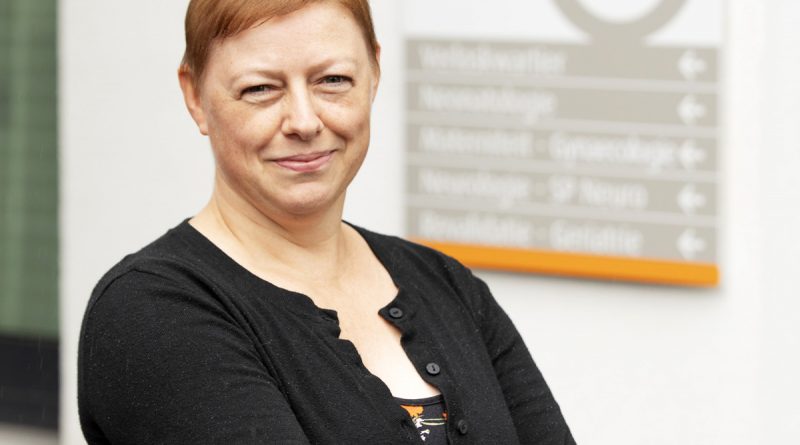BUILDING BRIDGES BETWEEN EMPLOYER AND EMPLOYEE
The healthcare sector sounded the alarm in June. Due to staff shortages, it is becoming increasingly difficult to provide healthcare.
Ingrid Hoeben has noticed it too. She coordinates the admission planning at the Heilig Hart Hospital in Leuven. “We have to close beds more than before, due to staff shortages,” she says. “The Covid pandemic has taken a lot out of our staff. We still feel the consequences.”
Ingrid has been working at the hospital for eleven years now. She graduated as an educator, but after a break in her career to take care of her children, she started working at the hospital. She started as a receptionist, but gradually climbed up the staff hierarchy. She has been coordinating the admission planning for three years now.
Rough start
It was a rough start, she recalls. “It is a puzzle and you need to think logically. But then again, it’s not brain surgery,” she laughs. “There is also a lot of negotiating with the parties involved. But I like that. Coordinating and leading are talents I have discovered in myself in recent years. I would like to do that more. At the moment, due to staff shortages, I often have to help drawing up the planning and I don’t always get around to coaching or teamwork, which is quite unfortunate.”
Ingrid started in her new position right before the Covid pandemic turned the hospital upside down. “That was an extremely tough period. Obviously, it was tough on medical staff, but the support services suffered as well. Without nurses, no hospital. But no hospital without support services either. It was a difficult period for everyone. The maintenance department had to clean the beds and rooms, the technical department had to install partitions to create separate wards, managers had their hands full with adjusting schedules and replacing sick colleagues. And we in the admission department had to rearrange the planning constantly because departments were being closed to free up more beds, or vice versa. It required enormous flexibility from everyone.”
xxx
Staff shortages
Even now, the aftermath of the pandemic is still causing issues. “A relatively large number of colleagues is still ill because of the crisis. Others have left the sector. Things are starting to get back to normal, but the pandemic has been tough. First, we had to reserve wards for Covid patients, then our capacity was limited due to staff shortages. One of her own team members has been absent for quite some time now. And in a small hospital, with small teams, that means that the team leader has to take on extra work on top of the usual workload. “At the moment, most of my time is spent on drawing up the admission planning. But there is a lot of work to do besides that: communicating with patients, optimising and digitising the admissions flow via an app, etc.”
The staff shortage is therefore one of the most important topics in the social dialogue, which Ingrid has been part of since 2020. “The issue with the staff shortage isn’t so much the inflow, but the retention. New colleagues start regularly. There are only a few specific departments in which inflow is an issue, for example geriatrics. It’s difficult finding staff for these departments.” But retaining staff is more difficult. “Especially nurses can job hop these days. A few become self-employed, others take the opportunity to work at another hospital as head nurse.”
xxx
Looking for creative solutions
So, together with the employer, they are looking for other ways to be an attractive working environment. “We’re going to have to be creative to solve the staff shortage. Wages are fixed. You can’t do much with that. Adding something else isn’t easy”, Ingrid knows. An important asset of the Heilig Hart Hospital is its small scale and the friendly atmosphere that comes with it. “With around 200 beds, we are a small regional player. And that has its advantages. Our approach is a lot more personal than that of bigger hospitals, which appeals to people. Better working hours and good arrangements for working overtime are important topics, so as a trade union, we try to focus on them.”
In the social dialogue, she tries to make a difference through her role in hospital management. “I like that double role. I always try to build bridges between the employer and the employees. I am in a good position as a manager to do so. I know the decision-making processes and I am able to contextualise things better for employees. But because I know people, it’s easier for me to say to management what needs to be said. I always try to work with others to improve our working environment. Isn’t that what everyone wants? Of course, there are opposing interests from time to time. Sometimes the employer gets his way, sometimes we do. But the dialogue is pretty well respected.”
xxx
Empathy
Sometimes, there is also tension between the various staff groups. “A lot of attention is paid to nurses. And rightfully so, their job is very demanding. But the ancillary services also deserve attention. The hardest battle is often fought by the nurses, which makes the other services often feel sidelined. And because the blue-collar workers are a minority at the hospital, they often feel like their concerns are not sufficiently addressed. It does sometimes take some empathy to pay enough attention to everything,” Ingrid has noticed. “It is important that we, as employees, are all on the same page. That is the only way we can move forward.”
Never Work Alone 2022 | Author: Jan Deceunynck | Image: Daniël Rys

